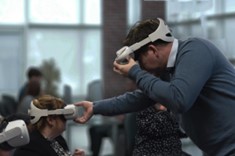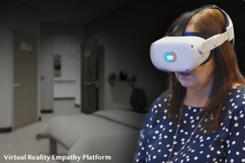Dementia in the Digital Age: Improving quality of life through Virtual Reality
As a keen mountaineer and climber, I recently I returned from my 1st summit attempt of Everest. For those reader unfamiliar with Everest, it is the world’s highest mountain!
The climb takes several days, with dangerous obstacles to overcome using ladders, ice axes and fixed ropes. It was utterly terrifying, exhausting and highly dangerous.
I left base camp at 3am and 15mins later I placed my tiny flag on the beautiful and lonely summit. I had traversed the Khumbu icefall, the Hilary step, 2 base camps along, and I was both ecstatic and exhausted as I removed my Oculus headset and collapsed i nto the safety of my comfy couch.
nto the safety of my comfy couch.
I have been fascinated by Everest since my youth, but I can safely say that any notion I ever held of climbing it had now completely evaporated as I realised my dream was more likely to be a complete nightmare than anything else.
So realistic was the VR experience that all the books, documentaries, and movies I have consumed over the past 30 years paled into insignificance compared to the 15min VR experience. Everything I thought I knew about Everest was unrealistic and I learnt more in that short time than I thought possible.
Experiencing the same environment through the eyes of someone else is a very interesting concept, especially when those eyes don’t see the environment in the same way as you do. Consider a person living with Dementia, they don’t experience the environment in the same way as you do. Colours, depth and field of vision, and contrasts in a space can all be altered to such a degree that they can blend into each other and cause confusion, anxiety, slips and falls to that person. This is a huge problem for those living with Dementia.
So, imagine if you could immerse yourself using VR into an environment and try to navigate the space both through your own eyes and the eyes of the person living with dementia. This could completely change your perception in a very short time in the same way as my 15mins on Everest have opened my eyes to the reality of climbing 8000m peaks.
VR-EP have created an immersive VR experience to do exactly this. This ingenious platform can transport you into a real-life environment (care home, kitchen, your own house) and allow you to experience the same environment through different eyes, both experiences will be completely different.
VR-EP have been using this tool to help architects understand how to design dementia friendly spaces. VR-EP has also been developed to deliver VR immersive training to carers and families through Age Scotland, allowing users to adopt a more empathetic approach when supporting someone with dementia and can implement minor changes to improve daily life.
been developed to deliver VR immersive training to carers and families through Age Scotland, allowing users to adopt a more empathetic approach when supporting someone with dementia and can implement minor changes to improve daily life.
This is a truly innovative use of gaming technology to change the world for the better for those living with dementia, their carers, families, designers, care homes and hospitals. This VR experience is game changing for everything we think we know and understand; from gaming, teaching & learning, and designing a better, greener, and more inclusive real world.
VR-EP uses the most up-to-date technology to encourage the development of more inclusive environments for those living with Dementia. We are all living longer with better healthcare and medicines, this does not always translate to us living better. While medicine is fantastic at adding years to our lives, the quality of these years is not always considered. The number of people living with Dementia in the UK by 2050 Is expected to rise to 1.6 million.
2050 is only 28 years away, this is our window of opportunity to make the lived experience of those living with Dementia safe, inclusive, and understood.
So, if you are working in the dementia realm, please feel free to get in touch with me and organise a free immersive experience to open your eyes and see if this technology could help you and your team deliver a better cared experience for everyone living with dementia.
You could also climb Everest if you fancied!
And, if you found this blog of interest, you can also read a range of other resources on housing and dementia on the Housing LIN’s dedicated webpages.
Lastly, if you would like to find out more about how the Housing LIN can support you develop your housing for older people strategic vision and/or operational plans to meet the future accommodation needs of older adults, including for people living with dementia and their carers, please email us at: info@housinglin.org.uk.

Comments
Add your comment